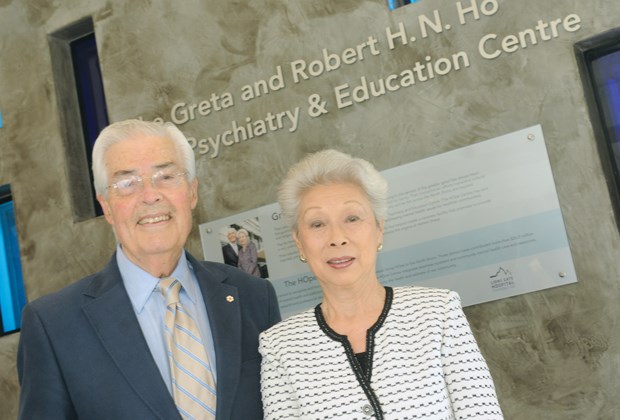West Vancouver businessman Robert Ho's fortune is not a flashy kind of wealth. It doesn't include sports cars, bling or get featured in the tabloids.
Ho's wealth is of the quiet variety that flies under the radar and acknowledges that being "comfortable," as Ho puts it, carries responsibilities to the greater good.
"Before you can receive, you must learn how to give," is the family motto that was passed down to Ho by his grandfather. "All our family members practise that."
Ho, now 82, is from one of Hong Kong's most prominent families. He is also the local philanthropist whose early $10 million donation to the Lions Gate Hospital Foundation launched efforts to build the recently-completed HOpe Centre for treatment of psychiatric illness.
That donation was key in building momentum for the project, although Ho likes to point out there were also 5,000 other private donors.
Still, with a few notable exceptions - like fellow North Shore philanthropist Djavad Mowafaghian, who donated $4 million to the project - most of the other contributors aren't in Ho's financial orbit.
In recent years, Ho and his wife Greta donated another $15 million towards a new research centre at Vancouver General Hospital.
He says picking projects to support isn't complicated.
"My philosophy's always been it's not what I want to give, it's what's needed," he says.
In the case of Lions Gate Hospital, he asked staff and the hospital foundation - which raises money for equipment and capital projects - what was needed.
They pointed him to the dilapidated "A2" psychiatric ward.
"It's about to fall apart," they told him. Ho's three visits to the facility convinced him of their cause.
Ho said he hopes the new facility that bears his name will help people to talk openly about mental illness - and the need for treatment.
He saw how mental illness affects families when the daughter of one of his close friends committed suicide.
But until recently, mental illness wasn't something that could be openly discussed, he says.
"In my generation and the generation above, it's been a discussion you hold behind closed doors," he says.
Ho's philosophy of giving - and the start of his family fortune - came from his grandfather, Sir Robert Ho Tung, who "started with nothing as a child" in Hong Kong, said Ho.
When he was young, his grandfather picked metal off the streets to sell by the pound, as a way to make money.
A school master who spotted him and "who thought he had a future"
invited the boy to go to school, where he learned Chinese and English.
Today his grandfather's foundation - the result of successful business ventures - is still the biggest philanthropic foundation in Hong Kong. "I'm just following his footsteps," says Ho.
His grandfather imparted a certain philosophy to Ho, including keeping a low profile: "You should be generous with money when you give it to a worthy cause, but you yourself shouldn't be driving around in a Ferrari," Ho explains.
Ho's modest West Vancouver office in an older commercial development reflects that.
"We are comfortable," he says. "We're not big time spenders, put it that way."
Ho and his wife, and their two sons - one lives in Hong Kong, the other in London - all give money to their own philanthropic causes. The family also donates towards projects promoting Chinese art and culture and the philosophy of Buddhism through the Robert R.N. Ho Family Foundation. It is through this foundation that the family is sponsoring the
Forbidden City exhibit featuring art from the court of Chinese emperors, which begins at the Vancouver Art Gallery next month.
Ho hasn't always been a businessman.
Before taking over the family business, Ho had a career as a reporter in the United States. It started when he was in high school and sat next to a sports writer at a soccer game. The writer got Ho a summer job at the newspaper. He went on to get his masters degree from Columbia University, to write for a paper in Pittsburgh, and work as a White House correspondent for National Geographic.
He eventually returned to Hong Kong, taking over the running of his family's property and investment companies.
In 1989 Ho emigrated to Canada. While his business interests span the globe he still lives in West Vancouver "up the hill."
"This is where my home is," he says.
It's also where Ho and his wife are continuing the family tradition of contributing their money to those who are in need.
"That's what we've been doing all our lives," he says.



